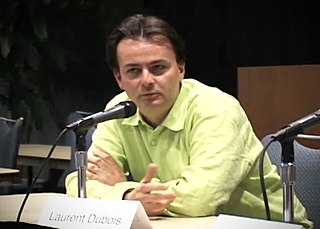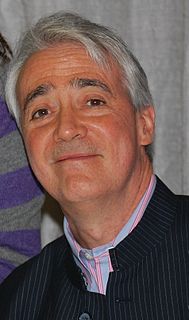A Quote by Ian Hamilton Finlay
I have often said that just as the French revolution, for instance, understood itself through antiquity, I think our time can be understood through the French revolution. It is quite a natural process to use other times to understand your own time.
Related Quotes
The transformations of the French empire itself or of French power structures themselves as well as the emergence of a kind of language of equal rights starting with the American Revolution and the French Revolution provided an opportunity and in some ways connected with other kinds of ground level desires or hopes and ideologies for freedom that were coming out of the plantation regime itself.
In comparison to the French Revolution, the American Revolution has come to seem a parochial and rather dull event. This, despitethe fact that the American Revolution was successful--realizing the purposes of the revolutionaries and establishing a durable political regime--while the French Revolution was a resounding failure, devouring its own children and leading to an imperial despotism, followed by an eventual restoration of the monarchy.
Justice has its anger, my lord Bishop, and the wrath of justice is an element of progress. Whatever else may be said of it, the French Revolution was the greatest step forward by mankind since the coming of Christ. It was unfinished, I agree, but still it was sublime. It released the untapped springs of society; it softened hearts, appeased, tranquilized, enlightened, and set flowing through the world the tides of civilization. It was good. The French Revolution was the anointing of humanity.
Human rights did not begin with the French Revolution...[they] really stem from a mixture of Judaism and Christianity...[we English] had 1688, our quiet revolution, where Parliament exerted its will over the King...it was not the sort of Revolution that France's was...'Liberty, equality, fraternity' - they forgot obligations and duties I think. And then of course the fraternity went missing for a long time.
I am grateful to the fossil fuel industry for bringing us the concentrated carbon that took us through the Industrial Revolution and through the technological revolution and brought us to the gateway of the renewable energy revolution, or what I call the sunlight revolution. But that is where we must part ways. It's the natural order.
A revolution is bloody, but America is in a unique position. She's the only country in history in a position actually to become involved in a bloodless revolution. The Russian revolution was bloody, Chinese revolution was bloody, French revolution was bloody, Cuban revolution was bloody, and there was nothing more bloody then the American Revolution. But today this country can become involved in a revolution that won't take bloodshed. All she's got to do is give the black man in this country everything that's due him, everything.
It's not uncommon for revolutions to stem from a radicalized group just outside the circle of power. That's what the French Revolution was all about; that's what the American Revolution was. The question is: Will all those groups, because of the nature of partisan polarization and ideological polarization, just fight each other? Or is there capacity to organize?
Strange bent over these things, with a concentration to rival Minervois's own, questioning, criticizing and proposing. Strange and the two engravers spoke French to each other. To Strange's surprize Childermass understood perfectly and even addressed one or twoquestions to Minervois in his own language. Unfortunately, Childermass's French was so strongly accented by his native Yorkshire that Minervois did not understand and asked Strange if Childermass was Dutch.
During my last voyage to America, I enjoyed the happiness of seeing that revolution completed, and, thinking of the one that would probably occur in France, I said in a speech to Congress, published everywhere except in the 'French Gazette,' 'May this revolution serve as a lesson to oppressors and as an example to the oppressed!'
In our own time, through integrative sciences like ecology and animal behavior and psychology we have re-understood what was forgotten during the reduction centuries of modern science. We've re-understood that the world is one thing, and it's a living thing. It's a thing with an intent and a spirit within it, and this is the key concept.






































